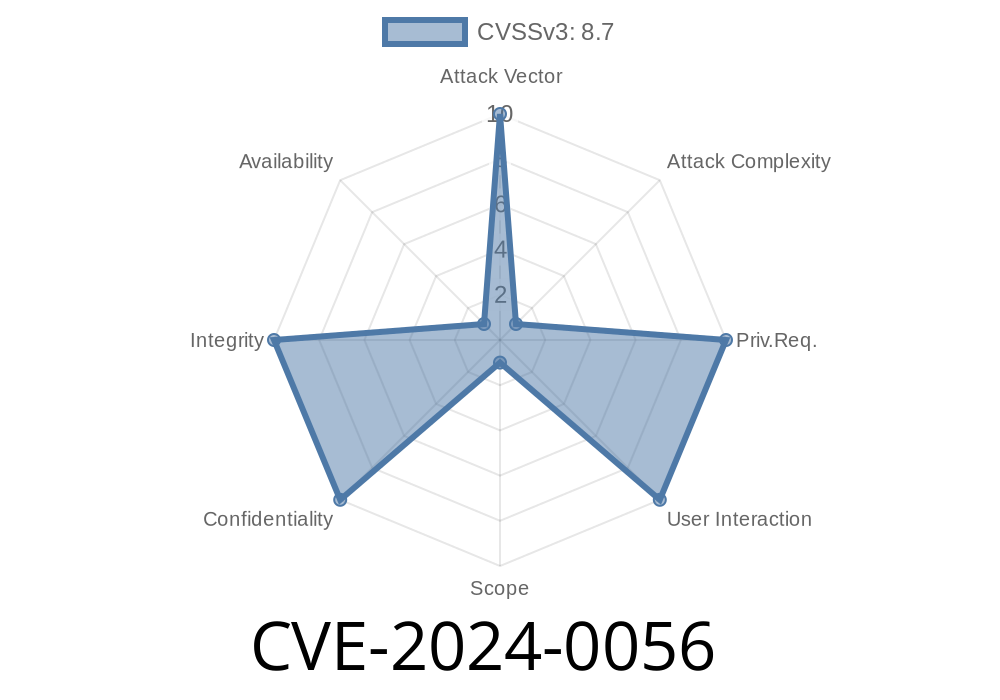On January 9, 2024, Microsoft published a security advisory (CVE-2024-0056) disclosing a vulnerability in their widely used SQL Data Providers: Microsoft.Data.SqlClient and System.Data.SqlClient. This caught the attention of developers and security professionals because these libraries power database connections across .NET applications worldwide.
In this article, I will break down what CVE-2024-0056 means in plain terms, show a simplified code example, link to original sources, and explain how attackers could try to exploit it—making everything easy to understand if you code or manage .NET platforms.
What is CVE-2024-0056?
This vulnerability is classed as a Security Feature Bypass. In short, it means the libraries do not correctly enforce security rules or expectations. In the case of Microsoft.Data.SqlClient and System.Data.SqlClient, certain connection settings intended to enforce security could be manipulated or ignored, potentially allowing unauthorized access to sensitive data or features.
All versions before 4.8.5
Both libraries are used to connect .NET applications to SQL Server databases.
How Does the Exploit Work?
Attackers may exploit this vulnerability to bypass key security features such as encryption requirements or connection string restrictions. This could allow them to:
Access or manipulate data they shouldn't
Let's walk through a simplified example based on what’s known.
Suppose you write code to enforce encrypted database communications
using System.Data.SqlClient;
public void ConnectToDatabase()
{
// Enforce encryption EXPECTED
var connectionString = "Server=sql.example.com;Database=MyDb;User Id=myUser;Password=myPass;Encrypt=true";
using (var conn = new SqlConnection(connectionString))
{
conn.Open();
// Perform secure operations
}
}
What’s the issue?
In affected versions, an attacker could potentially use connection string manipulation—either via user input or configuration tampering—causing the library to ignore the Encrypt=true directive, sending data in the clear.
Example of manipulated string
// This might make 'Encrypt=true' ignored under the vulnerable library logic
var unsafeConnectionString = "Server=sql.example.com;Database=MyDb;User Id=myUser;Password=myPass;Encrypt=true;SomeVulnParam=x";
If user-controlled input reaches the connection string, an attacker could exploit the parsing bug to switch off encryption or weaken other settings, bypassing intended protections.
Example with NuGet CLI:
dotnet add package Microsoft.Data.SqlClient --version 5.1.3
dotnet add package System.Data.SqlClient --version 4.8.5
Original References
- Microsoft Security Advisory CVE-2024-0056
- Microsoft.Data.SqlClient Release Notes
- System.Data.SqlClient Releases
- NVD Entry - CVE-2024-0056
Final Notes
If your .NET application uses SQL Server, double-check dependencies now! Even if user input can't directly edit connection strings, indirect exposures exist—think cloud config files, CI/CD pipelines, and less-trusted admins.
Audit your code for unsafe connection string handling.
- Use App Configuration Secrets to keep sensitive data safe.
- Regularly scan for dependency vulnerabilities (Dependabot is great!).
Stay alert. Vulnerabilities like CVE-2024-0056 remind us that even mature libraries can harbor subtle yet critical bugs.
If you found this breakdown helpful, please consider following [my profile](#) for more exclusive, plain-English security deep-dives.
Timeline
Published on: 01/09/2024 18:15:46 UTC
Last modified on: 01/16/2024 18:42:08 UTC
